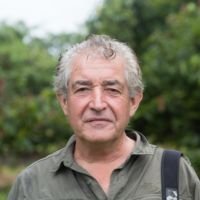Let's grow our own to boost food security
Post-Brexit, the passing of the Agriculture and Environment Acts has seen the biggest change in policy affecting farmers and consumers alike in almost fifty years.
Currently the UK is only about 60% self-sufficient in food. Major shocks such as Brexit, the Covid pandemic and most recently, the war in Ukraine have resulted in severe pressure on energy costs and food supplies. March saw a 17% rise in food inflation which has devastated households already under severe cost of living constraints.
The Conservative Party Manifesto for the 2019 General Election promised that the existing high standards of food and farming production would be maintained after leaving the EU.
The corollary must be the same standards should be met in meat and food imports from the EU and third countries. Sadly, that is not evident given the asymmetry in the Free Trade Agreement negotiated with Australia and New Zealand.
While 100% of the documentary evidence of food from third countries is inspected at the borders, only between one and thirty per cent of such imports undergo a physical examination.
That means there is great pressure on checks at retails outlets being conducted by local authorities. Given the financial pressures they operate under, it is not surprising that these checks may be patchy.
The Food Standards Agency has raised concerns about these issues and this is a matter that the Government should take seriously. Almost every ten years, there is a food scare or scandal, reference the Bovine spongiform encephalopathy (BSE) outbreak, foot and mouth and ten years ago, or the horse-gate affair.
There is concern that labelling checks do not adequately protect the consumer from fraud or imports of substandard meat.
The Department for Food, Environment and Rural Affairs (DEFRA) insists that no illegally produced foods such as hormone produced beef will enter the country under future Free Trade Agreements but what checks are in place to secure that?
Equally how can the consumer know that meat imported into this country does indeed meet the same high environmental and animal welfare standards that our farmers and producers must meet?
This takes on greater significance with the UK expressing interest in joining the Comprehensive and Progressive Agreement for Trans-Pacific Partnership (CPTPP) with countries ranging from Canada, Asia and Pacific regions.
Farmers Weekly recently uncovered the scandal of a major food processor passing off imported pork as more expensive British produce. This was a serious fraud lasting until late 2020 and should serve as an alarm to the ongoing potential for food scams and scandals.
Recently, Parliament agreed the regulations for the next reductions in direct farm payments. Concern was expressed that there is little support for upland farmers in the new Environmental Land Management Schemes (ELMS) and as yet, tenant farms face hurdles which did not exist when the active farmer qualified under existing schemes.
With farmers facing a 30% reduction in this year’s direct payments, there is now a funding gap for livestock farmers in particular before the full benefit of the ELMS schemes take effect .
If we have learnt anything from recent disruptions to food supplies, the Government should seek to increase our self-sufficiency in food, especially in growing more fruit and vegetables here. Food security and food safety are challenges we must meet and overcome and should be a higher priority for Government in policy making.
While climate change takes centre stage, we overlook resilience in our food production and food supplies at our peril. Farmers go out in all weather to put food on our plates.
The lowlands provide grain for staples such as bread and cereals, the uplands have for generations provided grazing for our livestock. We must value the role they play and seek to increase food production at home and become less dependent on imports.

To achieve more sustainable food, better food security and greater consumer satisfaction, we must aim to boost food production at home.

Baroness Anne McIntosh is a Conservative member of the House of Lords and former MP for Vale of York.












